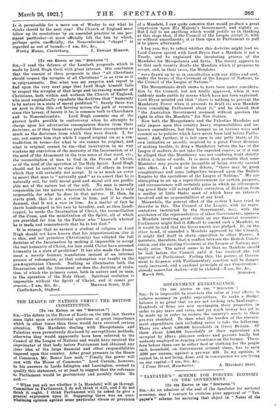THE LEAGUE OF NATIONS VERSUS THE BRITISH CONSTITUTION.
[To THE EDITOR or THE " SPECTATOR."'
Sm—The debate in the House of Lords on the 14th inst. throws some light upon constitutional questions of great importance which in other times than the would have received serious attention. The Mandates dealing with Mesopotamia and Palestine were prematurely disclosed by surreptitious methods, otherwise they would apparently have been referred to the Council of the League of Nations and would have received the imprimatur of that body before Parliament had obtained any clear idea of the large financial and other responsibilities imposed upon this country. After great pressure in the House of Commons, Mr. Boner Law said, " Finally the power will rest with the House of Commons." Lord Curzon, however, In his answers to Lords Islington and Lamington, seemed to qualify this statement, or at least to suggest that the reference to Parliament would be perfunctory and possibly futile. He said
" When you ask me whether it [a Mandate] will go through Committee in Parliament, I do not think it will, and I do not think it ought. I think Parliament will be asked to give a general expression upon it. Supposing there was an over- whelming opinion against some particular clause or provision
of a Mandate, I can quite conceive that would produce a great impression upon His Majesty's Government, and rightly so. But I fail to see anything which would justify us in thinking at this stage that, if the Council of the League accept it, with or without amendments, it is then open to Parliament to pull it to pieces afterward,."
I beg you, Sir, to reflect whither this doctrine might lead us. Lord Curzon agreed with Lord Bryce that a Mandate is not a Treaty, and he explained the incubating process of the Mandates for Mesopotamia and Syria. The theory appears to be that each country drafts the Mandate which it proposes to accept, and, in their cases, the Mandates " were drawn up by us in consultation with our Allies and sent, under the terms of the Covenant of the League of Nations, to the Council of the League of Nations."
The Mesopotamia draft seems to have been under considera- tion by the Council, but not finally approved, when it was suddenly made public by means which have not been explained. Lord Bryce pointed out that " there is nothing to prevent the Mandatory Power when it proceeds to draft its own Mandate from consulting Parliament about it," and he showed that " the Australian Government assumed without question the right to alter the Mandate." for New Guinea.
Now both the Mesopotamia and the Palestine Mandates not only impose upon this country heavy responsibilities and un- known expenditure, but they hamper us in various ways and commit us to policies which have never been laid before Parlia- ment. And, further, it is left open to any petty State, of its own initiative or secretly inspired by a great Power desirous of making trouble, to drag a Mandatory before the bar of the League if matters do not take the expected course, or if it can be alleged that this Mandatory was not confining itself strictly within a form of words. It is more than probable that some Mandates may prove quite incapable of being strictly carried into effect. As I said in the debate, " there may be great complications and some indignities imposed upon the British Empire by the operations of the League of Nations." We are attempting to set up a super-Government for certain purposes, and circumstances will certainly arise in which no self-respect- ing great State will accept either correction of dictation from a medley of little States most of which have no interests involved and no responsibilities of any kind.
Meanwhile, the general effect of the system I have tried to describe is this. The Council of the League, with its repre- sentatives instructed by the Government, may, with the assistance of the representatives of other Governments, approve a Mandate involving great strain on our financial resources. Parliament might find it difficult to amend such a Mandate, as it would be told that the Government was pledged. If, on the other hand, it amended .a Mandate approved by the Council. it might find itself in sharp opposition to other Powers. I maintain, therefore, that a conflict between the British Consti- tution and the existing Covenant of the League of Nations may easily arise. The moral seems to be that no Mandate should be laid before the Council until it has received .the full approval of Parliament. Failing this, the powers of Govern- ment to dispense with Parliamentary sanction will be danger- ously increased, and a cardinal principle of our Constitution— already somewhat shaken—will be violathd.—I am, Sir, &c.,


































 Previous page
Previous page